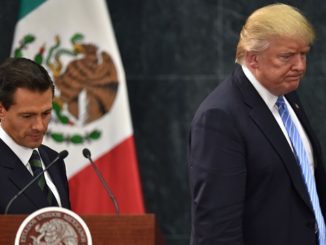
The U.S. must stick to its principles of democracy, anti-corruption and integrated economies in Latin America.
by Antonio Garza
Latin America has been rocked by protest movements, the rise of populist leaders and economic stagnation. The region has witnessed dramatic ups and downs, at times taking bold steps to confront corruption, promote human rights, and strengthen rule of law, and just as frequently sliding backward on all these fronts. The trends are not new, but what has changed is the United States’ narrow focus and increasingly limited presence in Latin America.
Over the last few years, the U.S. has shown a rhetorical commitment to democratic governance, economic prosperity and security. The U.S. administration has taken steps to support these objectives, such as pushing through the U.S.-Mexico-Canada (USMCA) Trade Agreement and recognizing Venezuela’s President Juan Guaidó as the country’s democratically elected leader. However, the U.S. administration has also taken a range of actions to pursue an America First policy or limit migration that have undermined these very same interests. These include withdrawing from the Trans-Pacific Partnership, slashing foreign aid across Central America and increasing political tensions with Mexico.
Several principles should govern U.S. foreign policy toward Latin America.
At the center of any comprehensive U.S. policy toward Latin America should be a focus on strengthening democratic governance and anti-corruption efforts. This would mean supporting allies around the region that are taking steps to build up their democracies and applying targeted U.S. foreign policy pressure on countries, such as Venezuela and Nicaragua, that are moving in the opposite direction. The U.S. should also support efforts to root out corruption regionally and make this a hallmark of its foreign policy. It’s unlikely that we’ll see the return of the most high-profile anti-corruption efforts, such as the International Commission against Impunity in Guatemala, given recent governmental pushback. However, these efforts should serve as a foundation for future programs and policies.
A second principle for any U.S. policy should be a push for increased economic prosperity and integration. This pillar would include promoting regional trade, investment, and job creation; raising labor and environmental standards; and paying special attention to historically marginalized communities. These efforts will be even more important now amid the COVID-19 pandemic, given the sharp economic contractions throughout the hemisphere, and China’s expanded presence in the region. Yet, in a push for economic integration, we must also prioritize support and retraining for workers who find themselves in sectors that are more negatively affected by these agreements. This is true in the United States, and U.S. policy should encourage other countries to do the same.
Along with economic integration, U.S. foreign policy should also continue to embrace regional energy interconnectedness. By linking countries and their electricity grids, Latin America can build resilience and reduce energy costs for citizens and businesses. This would include investing in energy projects along the U.S.-Mexico border and seeking to connect Mexico and Central America’s electricity grids. It should also include supporting Latin America’s transition toward clean energy sources. However, to have a significant effect, these economic and energy objectives would have to be combined with a strong rule of law to ensure contract compliance and business confidence.
The third fundamental pillars for U.S. foreign policy toward the region must be unequivocal support for human rights. This means taking human rights into account throughout U.S. policy design, holding other countries to high standards, and supporting civil society organizations that conduct this vital work. It will also mean accepting responsibility for U.S. policies that have contributed to human rights abuses or where the United States continues to work on improving its own performance domestically. Equally important, it means championing a robust and independent press that holds all governments accountable.
Along with these overarching principles, the United States should not overlook the power of people-to-people connections. To build a successful and resilient hemisphere, we need Americans who understand Latin America and Latin Americans who understand the United States. We can help to foster this mutual understanding through area studies and language programs, study abroad programs and professional exchanges. These exchanges benefit U.S. and Latin American citizens who master another language, spend time in another culture, and share academic, scientific or other expertise. Simultaneously, they also build the ties that shape our economies and regional relations far into the future.
Essential to U.S. policy toward Latin America is our relationship with Mexico. Too often, Mexico is viewed solely in the context of U.S. domestic challenges. However, this approach fails to realize the relationship’s full potential. Mexico should be the United States’ key strategic ally in the region. With an intertwined economy, society and history, our two countries should be cooperating bilaterally on a host of issues — including economic, climate, health, security and migration policy — and working together on a broad range of regional and international issues.
The United States should take this moment of historic upheaval and commit to a principled and forward-looking policy for Latin America. This approach would both support U.S. objectives and address shared interests within the region. Latin America is a critically important region for the United States on a daily basis and U.S. foreign policy should reflect it.
Antonio Garza served as the U.S. ambassador to Mexico from 2002 to 2009. He is now counsel to the law firm of White & Case in Mexico City. He wrote this column for The Dallas Morning News.



